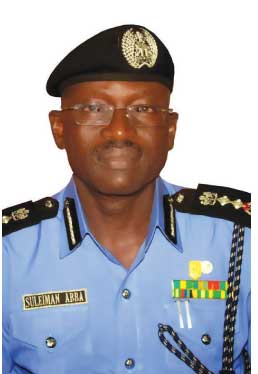The IGP implored officers and men of the force to desist from infringing on the rights of the citizens to gain the confidence of the public. He particularly warned police recruits against corruption, stressing that the force could not afford to compromise its primary function of protecting lives and property of the people.

The changes in Nigeria’s democratic process imposed a huge challenge on the police officers for which they must not be found wanting.
His words: “Our primary and sacred function of protection of lives and property must not be compromised. Corrupt practices must be absolutely avoided if we must have confidence of the citizens. As police, we must take into cognisance the fundamental human rights of every citizen which must not be infringed upon, so as to gain the confidence of the public.”
Despite the IGP’s oft-repeated sermons and admonition to police officers, extra-judicial killings by police (and personnel of other law enforcement and security agencies) remain a routine and the list of unresolved cases continues to grow day after day.
From daily news reports, documented reports by several local NGOs like NOPRIN, reports by many international NGOs such as Human Rights Watch (in ‘Rest in Pieces’), Amnesty International (in ‘Killing at Will’) and foreign governments like the United States Government (in its State Department’s Annual Reports on State of Human Rights in Countries across the world), as well as reports by the United Nations (UN) organs, it has been consistent damning verdicts on the state of human rights performance by Nigerian governments since the return to civil rule in 1999. Every successive report singles out the Nigerian police as the worse violator of human rights.
Sample of recent cases
In February 2013, NOPRIN expressed serious concern over the never-ending incidents of extra-judicial killings by law enforcement and security agents in Nigeria. NOPRIN condemned, in particular, the February 25, 2013 gruesome murder of two students and grievous injury on four students of Nasarawa State University allegedly by Nigerian soldiers and police. Owing to the buck-passing between the police and the soldiers over who carried out the killing, NOPRIN called for a judicial panel of Inquiry to unravel those responsible, so that they could be brought to account and the families of the victims adequately compensated.
On May 27, 2013, a final year University of Benin (UNIBEN) student, Ibrahim Momodu, was shot dead allegedly by the Divisional Police Officer (DPO) of Ogida Police Station, Edo State, Mrs. Carol Afegbai, and other members of her patrol team.
Although the Edo police command claimed that the late Momodu was killed while attempting to fire at the police, reports quote preliminary reports from the pathologists, who examined his remains as showing that he was shot from the back with three bullets, which tore his heart, before exiting through the upper part of his chest.
Ideally, the DPO and other suspected accomplices should be subjected to orderly room trial, dismissed – if indicted, and arraigned for murder. However, the Edo State Police Commissioner, Folunsho Adebanjo, is reported to have redeployed the DPO and her orderly, according to him, “to have a smooth investigation”.
And, understandably, family members of the victim are suspicious of the motive of the police and are insisting, through their lawyers that “the proper procedure for murder case is for the police after investigation to charge the suspects to court and, thereafter, the court would order the duplication of the file to be sent to the office of DPP (Director for Public Prosecution) and not the other way round”.
In retrospect, founded fears
The fears of the family are founded. Police have, on many occasions in the past, employed same gimmicks to shield perpetrators from justice. Back in 2006, another female police DPO, Edna, then at Fegge Police Division, Onitsha, Anambra State, tried to compound felony by covering up a police corporal, Daniel Ayuba, who shot dead a lady, Nkechi Obidigwe, at a police checkpoint somewhere along Zik Avenue, Fegge.
The truth later emerged when, at the intervention of Mr. Katsina (then ACP at State CID, Awka), an impartial investigation was carried out which led to the identification of the killer police corporal, who, indeed, confessed during an orderly room trial. The DPO denied that her men were responsible and claimed that it was Movement for the Actualisation of the Sovereign State of Biafra (MASSOB) members that shot the girl.
The matter was later taken over by the State CID, Awka, following a petition by the family members and the public outrage it generated. Three officers at the checkpoint were fished out, arrested and detained. Autopsy revealed that a police bullet AK47 killed the victim. But the DPO continued to deny and even attempted to intimidate the family.
A ballistic examination confirmed that the bullet was from a police gun, and the three officers were subjected to orderly room trial. The particular officer, who fired the shot, was admitted. He was later charged for murder and remanded in Onitsha prison. DPO Edna was not made to face the legal consequences of her misconduct, but was immediately posted out of Fegge.
Not the police alone…
Killings are not carried out by the police alone. Personnel of other uniformed services – the army, navy, air force, and even paramilitary agencies – also are occasionally involved in the use of excessive force and extrajudicial killing. The 2011 reprisal in which soldiers from 242 Battalion, Ibereko, along Lagos-Badagry Expressway, ambushed and murdered CSP Saliu Samuel, the DPO of Badagry Police Division, and his DCO on their way to the barracks on a peace mission, is one recent example of a pattern of reprisal killing by members of the armed forces.




